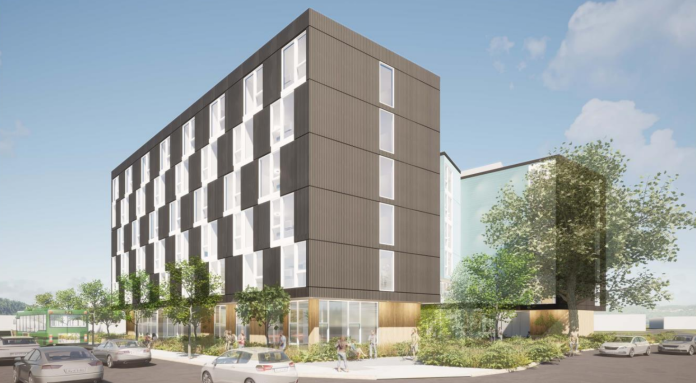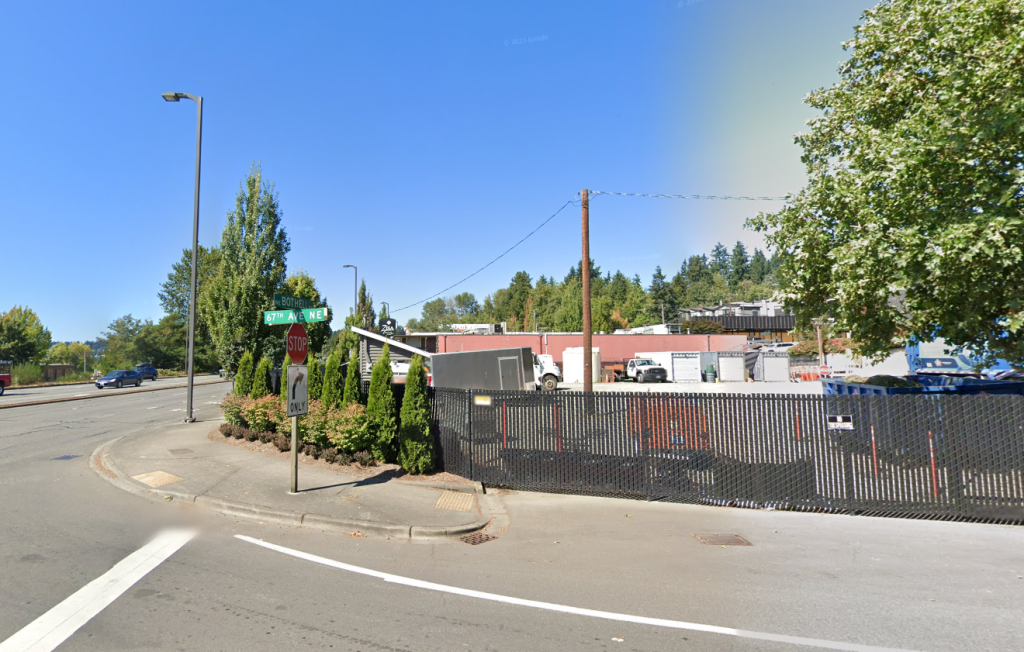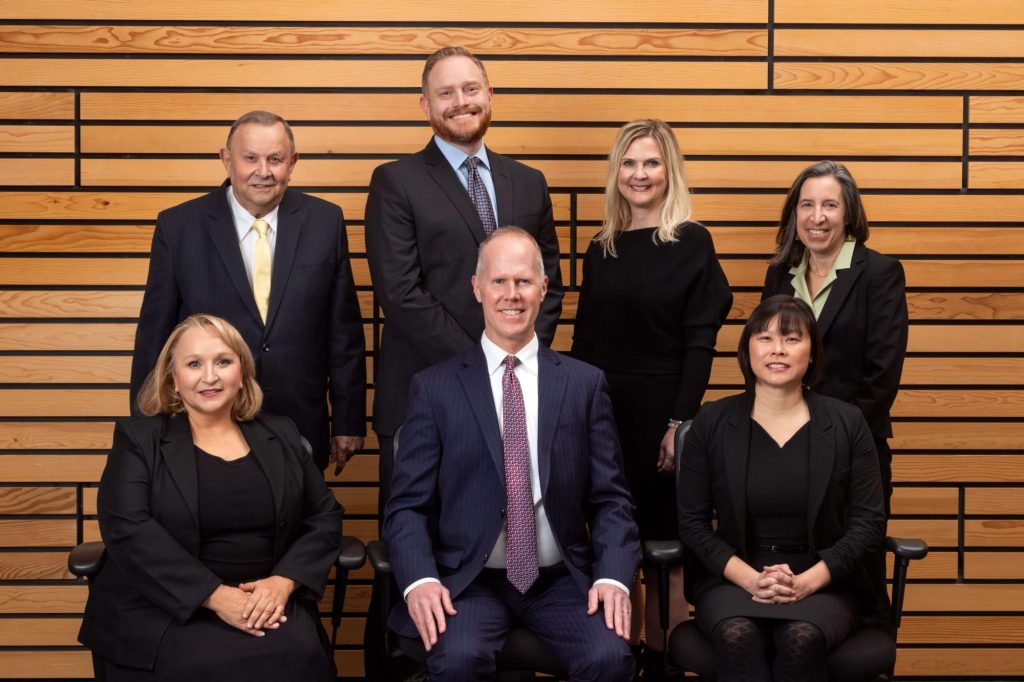
Kenmore could be flushing $30 million in grants and the 100 affordable homes they were intended to fund.
Following a marathon public hearing that ran until late Tuesday morning, the Kenmore City Council voted 6-1 this week to reject a development agreement that would allow Plymouth Housing to construct a facility that would create a place to live for very low-income residents steps from frequent transit along Bothell Way NE. The planned six-story building, which would include a mix of 100 studio and one-bedroom units, has been moving forward at the City since last year, and is fully funded via a mix of city, state, and nonprofit sources.
Kenmore’s City Manager Rob Karlinsey had recommended the Council approve the agreement, noting that expanding the city’s affordable housing stock had been the number one priority for the City Council in recent years. House Bill 1220, a state law passed by the legislature in 2021, requires that cities specifically plan for needed affordable housing at different income levels. In Kenmore’s case, the law sets a target exceeding 1,600 homes that are affordable to people earning less than 30% of the area median income (AMI), which locally is $28,800 for a single adult.
That goal includes 559 units of permanent supportive housing, designed for people immediately exiting homelessness and who require a higher level of direct services. That type of housing is typically the most expensive type of subsidized housing, with an extreme shortage in King County, particularly outside Seattle’s core neighborhoods. A Regional Coalition for Housing (ARCH), which is contributing 7% of the funding for this project, consolidates funds from cities across East and North King County with a goal of creating just these types of units. The additional assembled funding includes $30 million from the Washington State Department of Commerce and the Washington State Housing Finance Commission (WSHFC).
Tuesday morning’s vote became a stark illustration of a small city’s stated goals of creating affordable housing running headlong into opposition from local residents raising vague concerns around the impact of that new housing. Numerous public commenters overnight brought up the idea that Plymouth’s building had been initially presented as providing housing for seniors and veterans, not for people directly exiting homelessness. Yet, coverage in places like the Bothell-Kenmore Reporter from last summer noted the facility would be serving “formerly houseless individuals” making no or very low incomes.
“Nothing has changed about the services and service levels from the original project proposal and where we are today,” the staff report from the city manager’s office noted. “[The Department of] Commerce is prioritizing funding for projects that provide housing for those most in need: those who are unhoused. In order to be competitive, we must meet that priority.”
Residents speaking in opposition also raised concerns that the housing would be utilized by people experiencing homelessness outside Kenmore, despite the fact that Plymouth has a 100% referral goal for the Kenmore building. While King County has not conduced a full regional count of people living unsheltered since 2020, the count that year found more than 200 people in need of permanent housing just in North King County, which includes Kenmore, Bothell, Shoreline, and Woodinville.

During the meeting, staff at Plymouth Housing pushed back on the idea that the city was proposing a new homeless shelter in Kenmore. “Plymouth housing is permanent supportive housing,” Plymouth CEO Karen Lee told the council. “We are not a shelter. We are not a day center. This is an apartment building with permanent support for residents.”
Kenmore city staff, presenting the proposal to council this week, took pains to emphasize that approving the project was in line with prior direction from the city council and their own adopted goals. “In October of 2021, Council gave staff a really clear direction to get units on the ground,” Deputy City Manager Stephanie Lucash said late Monday night. “It can take years to secure this funding, and staff at Kenmore, with Plymouth’s leadership, did this in 18 months. It’s unprecedented. You asked us to get a building built, units on the ground, and that’s what this project does.”
But several Councilmembers voting no asserted they still support the project in theory, but still had outstanding concerns. “Though I definitely support our underlying goals, I just have a number of questions and more information is needed I think than can be answered here, involving, among other things, density as it concerns the public benefit and our departure from density,” Councilmember Joe Marshall said, also referencing a concern around parking.
“It’s not clear to me the public benefit is greater or equal to the value we’re offering,” Councilmember Angela Kugler said. One councilmember appeared to have no qualms whatsoever about opposing the project, however: outgoing Councilmember David Baker. “I guess I can’t just say no… hell no,” he said before the vote.

During the meeting, other councilmembers came under scrutiny for a potential conflict-of-interest, with Mayor Nigel Herbig currently employed as intergovernmental relations manager for the King County Regional Homelessness Authority, and Councilmember Debra Srebnik currently working as climate policy analyst for the Washington Department of Commerce, which is partially funding the project via its housing trust fund. After both electeds made the case for why they didn’t feel like they needed to recuse from the vote, both Herbig and Srebnik voted no, seeming to go along with the consensus on the rest of the council.
Councilmember Corina Pfeil, who was the only vote in favor of moving forward, pointed to conflicts of interest as tarnishing the entire process even as she supported the project.
“Permanent supportive housing such as this is really important. It does meet our goals, and our objectives, and our DEI goals, [and] provides resources, support services, counseling, behavioral social services, jobs, investments in people and infrastructure,” Pfeil said. “When we think about decency, respect and integrity of process, I can also say with what was also just publicly displayed by a set of council members, and what I heard earlier tonight, that it’s clear to me that there is an implicit bias that exists, and there could not be a fair process for this vote tonight.”
Yet both elected officials can make a clear case for how their day jobs make them more informed as to the necessity of this project and the trade-offs that are involved, both for the City of Kenmore and the region as a whole, as King County faces a severe shortage of housing that impacts lower-income people the most. Herbig, an outspoken proponent of affordable housing, kept his comments to a minimum at the vote.
It’s possible that the council works quickly to reconsider the proposal in the coming weeks, to not lose any of the assembled funding. But Kenmore City staff told the council that definitively saying no could put the city at risk of being able to fund future projects: “If we decline this $30 million from Commerce and WSHFC, it is very possible that future funding requests for projects in Kenmore would not receive similar favorable consideration by those two funders. Without Commerce and WSHFC funding, it is virtually impossible to get affordable housing projects completed in Washington State.”
Ryan Packer has been writing for The Urbanist since 2015, and currently reports full-time as Contributing Editor. Their beats are transportation, land use, public space, traffic safety, and obscure community meetings. Packer has also reported for other regional outlets including BikePortland, Seattle Met, and PubliCola. They live in the Capitol Hill neighborhood of Seattle.

